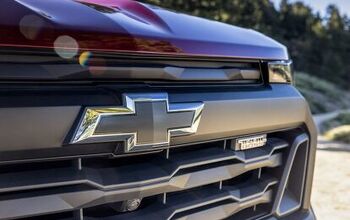Onstar Responds To Privacy Concerns. Again. Still.
Concerns over privacy have haunted GM’s OnStar business for as long as it’s been around, and responses like this video have become something of an annual routine for OnStar’s executives. The latest round of furor involves changes to OnStar’s policies, which the New York Times describes thusly
The first regards what happens when a customer cancels the service. Until now, when OnStar service stopped, so did the vehicle’s two-way communications system. As of Dec. 1, however, that will not necessarily be the case. Vehicles of owners who no longer subscribe could still be monitored via the system’s still-active two-way cellular link.
The second policy change concerns the potential use of the data collected by OnStar, which includes information like the vehicle’s speed and location, current odometer reading, driver seat-belt use and air-bag deployment. Under the new terms, OnStar reserves the right to share that information with other companies and organizations, even data culled from motorists who no longer subscribe to the service but who have left the two-way communications connection open.
Of course, OnStar says GM customers can opt out of the service, but it’s making the case that by only sharing anonymous data, it can limit meaningful privacy concerns. But OnStar doesn’t exist in a vacuum, and as it continues to sell Americans on the notion that security is worth sacrificing some sense of privacy for, it will find itself increasingly pulled into a national debate.
OnStar’s execs are clearly walking a line here, as there’s no doubt OnStar-provided data is used in a number of ways that they argue is intended to benefit the customer. Monitoring usage patterns in the Chevy Volt is one example. Allowing vehicle owners to spy on their kids and spouses is another. But by pushing these services, OnStar finds itself at the cutting edge of a profound national debate on the balance between privacy and security that has been simmering just below the national consciousness in the decade since 9/11.
OnStar is clearly aligning itself with the side of security, not only offering nanny services to its users, but now giving them nanny powers over people who use their cars as well. In the short term, this has been a strong play: history shows that OnStar has picked the winning side in the debate, as most security/privacy tradefoffs since 9/11 have been decided in favor of security. But as measures like pay-per-mile vehicle tracking gain political momentum (the talk in DC is that government tracking of every vehicle is “unavoidable” in the middle-to-long-term), a backlash may well be brewing.
The problem with picking any one side of a fundamental political tradeoff is that eventually your side overreaches, sparking a backlash. When pay-per-mile taxation becomes a serious policy proposal, a political near-inevitability in the next ten years, all of the slippery concessions to security-over-privacy that led up to government tracking of every vehicle in America will be seen in a very different light. OnStar (and its analogues, which are spreading throughout the industry) will clearly be identified as a poster boy for the tradeoff between privacy and security, and faced with mandatory government tracking, it’s hard to see Americans remaining in love with the idea of voluntary tracking. Already the backlash is brewing, and public responses to privacy concerns will be a fact of life for firms like OnStar. But then, that’s just a part of the cost of doing business when you’re selling services that prey on paranoia, and asks customers to trust your benevolent gaze more than the often-terrifying randomness of the universe.
More by Edward Niedermeyer
Latest Car Reviews
Read moreLatest Product Reviews
Read moreRecent Comments
- Keith Most of the stanced VAGS with roof racks are nuisance drivers in my area. Very likely this one's been driven hard. And that silly roof rack is extra $'s, likely at full retail lol. Reminds me of the guys back in the late 20th century would put in their ads that the installed aftermarket stereo would be a negotiated extra. Were they going to go find and reinstall that old Delco if you didn't want the Kraco/Jenson set up they hacked in?
- MaintenanceCosts Poorly packaged, oddly proportioned small CUV with an unrefined hybrid powertrain and a luxury-market price? Who wouldn't want it?
- MaintenanceCosts Who knows whether it rides or handles acceptably or whether it chews up a set of tires in 5000 miles, but we definitely know it has a "mature stance."Sounds like JUST the kind of previous owner you'd want…
- 28-Cars-Later Nissan will be very fortunate to not be in the Japanese equivalent of Chapter 11 reorganization over the next 36 months, "getting rolling" is a luxury (also, I see what you did there).
- MaintenanceCosts RAM! RAM! RAM! ...... the child in the crosswalk that you can't see over the hood of this factory-lifted beast.

































Comments
Join the conversation
Somehow this is the UAW's fault.
I own both my car and my pair of wirecutters. Problem solved! I don't on a GM car, though, so I don't know if OnStar shares an antenna lead with some communication service that I actually want (such as GPS). But I've had this concern about OnStar since the first time I considered a GM car a few years ago. It's certainly a mark in the "disadvantage" column for GM vehicles.